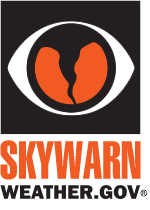
A major winter storm is expected to bring heavy snow, strong winds, and coastal flooding across the Mid-Atlantic and Northeast that may cause impossible travel conditions and power outages. Blizzard conditions are possible along coastal areas from the DelMarVa Peninsula through southeastern New England. Wet weather and strong winds return to the Pacific Northwest and north-central California. Read More >
Weather Spotter Resource Page
What is an NWS Weather Spotter?
The National Weather Service in Spokane is looking for volunteers who would like to become weather spotters. Weather spotters provide 'on the spot' weather reports -- which cannot be replaced by other means. These weather reports greatly assist the National Weather Service in determining the strength of a storm and its effects on the surrounding area.
What Kind of Weather Do Spotters Report?
Most people think weather spotters are only useful to the National Weather Service during thunderstorm season. However, spotters are vital to the year-round operations of the National Weather Service. For example, reports of freezing rain, snow and flooding are equally useful to forecasters.
Where are weather spotters needed?
The National Weather Service is always recruiting new weather spotters in ALL parts of the Inland Northwest. There is currently a large concentration of spotters in the bigger cities of the region; like the Spokane metro area, Coeur d'Alene, Wenatchee, Lewiston, Moses Lake, and Pullman. There is a big need for spotters in many of the data sparse areas of the Columbia Basin and the northern Mountains. Overall, we welcome spotters from every county across the Inland Northwest.
So How Do You Become a Weather Spotter?
Simply contact the NWS. Please include your name, address, phone number, elevation and distance from town.
After the information is processed, you will become a registered weather spotter and receive a personal Spotter ID number via email. Then you will be able to provide official spotter reports through our 800 number or online
​We occasionally call our spotters at home to help assess weather situations -- and give us an 'eyes on' view of the weather in their area. The most important types of weather to report to the National Weather Service include snow, flooding, heavy rain, wind damage, hail and tornadoes/funnel clouds.
What about Weather Spotter Training?
Spotter training sessions are important and needed to stay current on severe weather spotting. The sessions are conducted by the National Weather Service in the spring and fall. It's an opportunity for spotters to review basic spotter techniques and weather safety concerns.
Locally Recorded Spotter Training
|
National Spotter and Observer Training
|
|||||||||
|
Additional Weather Spotter Resources
Weather Acronyms & Abbreviations
|
|||||||||